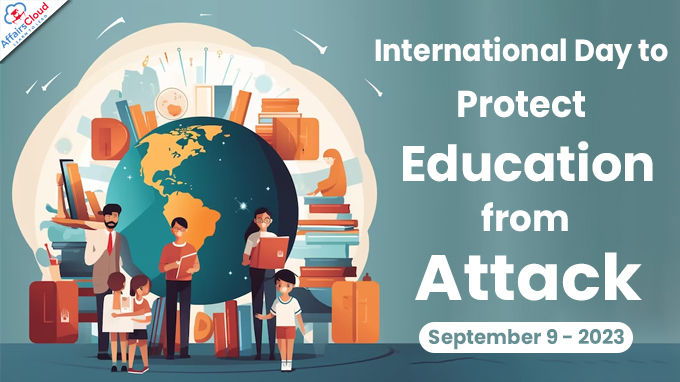 The United Nations (UN) International Day to Protect Education from Attack is annually observed across the globe on 9th September, to raise awareness about the pressing issue of attacks on schools, students, education personnel, and teachers worldwide.
The United Nations (UN) International Day to Protect Education from Attack is annually observed across the globe on 9th September, to raise awareness about the pressing issue of attacks on schools, students, education personnel, and teachers worldwide.
9th September 2023 marks the observance of the 4th International Day to Protect Education from Attack.
Significance:
- The day also aims to raise awareness of the plight of millions of children living in countries affected by conflict.
- The day serves as a reminder to signify the importance of safeguarding schools as places of protection and safety for students and educators and the need to keep education at the top of the public agenda.
Background:
i.On 28 May 2020, the United Nations General Assembly (UNGA) adopted the resolution A/RES/74/275 and proclaimed the 9th September of every year as the International Day to Protect Education from Attack.
- The resolution proclaiming the Day was presented by the State of Qatar and co-sponsored by 62 countries.
ii.The annual observance of the Day is facilitated by the United Nations Educational, Scientific and Cultural Organization (UNESCO) and the United Nations International Children’s Emergency Fund (UNICEF) in close collaboration with partners within and outside the UN system.
iii.The first-ever International Day to Protect Education from Attack was observed on 9th September 2020.
Need to Protect Education from Attack:
i.Places of education should be safe havens for children, students, and education personnel. However, out of school, children are easy targets and direct targets of abuse and exploitation.
ii.The day serves as a reminder that children and youth continue to face conflict, violence, and disruption to their education, undermining their right to learn and thrive in a peaceful and nurturing environment.
iii.According to national education targets, the percentage of students attaining basic reading skills by the end of primary school is projected to rise from 51% in 2015 to 67% by 2030.
- However, an estimated 300 million children and young people will still lack basic numeracy and literacy skills by 2030.
Safe Schools Declaration (SSD):
i.The Safe Schools Declaration was introduced in Oslo, Norway, in May 2015. It’s an inter-governmental political commitment to safeguarding students, teachers, schools, and universities in the midst of armed conflicts.
ii.Its objectives extend beyond protection to ensure that education can persevere during times of war and to actively discourage the military use of schools.
iii.The Declaration is a framework for collaboration and exchange, and endorsing countries meet regularly to review the Declaration’s implementation.
- Currently, 118 States have endorsed the Safe Schools Declaration, and Zambia was the 118th state to endorse the SSD.
Six Grave Violations:
i.The six grave violations serve as the basis to gather information and report on violations affecting children and are:
- Killing and maiming of children;
- Recruitment or use of children as soldiers;
- Sexual violence against children;
- Abduction of children;
- Attacks against schools or hospitals;
- Denial of humanitarian access for children.
ii.In August 2023, the Government of Ukraine signed a joint prevention plan with the support of the UN to end and prevent grave violations against children.
Global Coalition to Protect Education from Attack (GCPEA):
i.GCPEA is a unique inter-agency coalition formed in 2010 to address the problem of targeted attacks on education during armed conflict.
ii.UNESCO is a core member of GCPEA and remains committed to raising awareness and contributing to policy dialogue; deepening research on effective prevention and response strategies.
Key Points:
i.According to the UN Secretary-General Annual Report on Children and Armed Conflict published on 5th June 2023:
- In 2022, children continued to be disproportionately affected by armed conflict, and the number affected by grave violations increased compared with 2021.
- From January to December 2022, there was a 112% increase in attacks on schools (1,163) and hospitals (647), particularly in Ukraine, Burkina Faso, Israel, the State of Palestine, Myanmar, Mali and Afghanistan.
- In Afghanistan, the UN verified 95 attacks (72 on schools; and 23 on hospitals), including attacks on protected persons.
- While non-state armed groups were responsible for 50% of grave violations, government forces were the main perpetrators of the killing and maiming of children, attacks on schools and hospitals, and the denial of humanitarian access.
ii.According to GCPEA, Over 14,500 reports of attacks on education or military use of educational facilities were recorded worldwide between 2017 and 2022.
- More than 28,000 students, teachers, and academics were injured, killed, or harmed in such attacks carried out in situations of armed conflict or insecurity.
2023 Events:
i.To mark the 4th International Day to Protect Education from Attack, a main High-Level Observance is co-organized by UNESCO, the State of Qatar, Education Above All (EAA) Foundation, UNICEF, and the United Nations Department of Global Communications.
- The event will take place on 13 September 2023, at the UN Headquarters in New York, the United States of America.
- This event is part of a week-long commemoration dedicated to galvanizing action to safeguard education, focusing on the theme of “Justice for Victims“.
ii.On 11 September 2023, in parallel with the 54th session of the UN Human Rights Council, Geneva (Switzerland) hosted a high-level commemoration at the Palais des Nations, Switzerland.
- The event delved into actionable steps to prevent and mitigate the devastating impact of attacks on education. A key focus was the endorsement and implementation of the SSD.
About United Nations Educational, Scientific and Cultural Organization (UNESCO):
Director-General – Ms. Audrey Azoulay
Headquarters– Paris, France
Founded in– 1945




